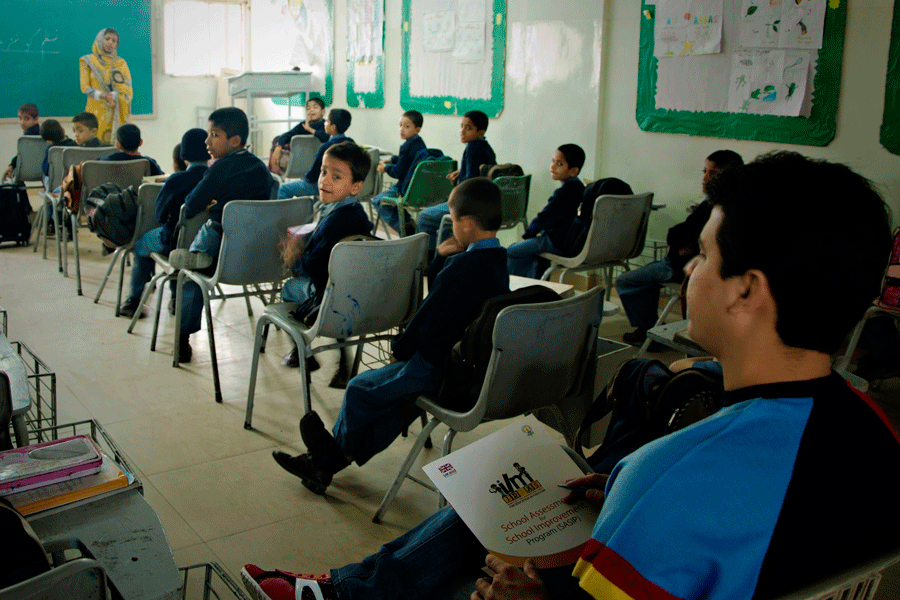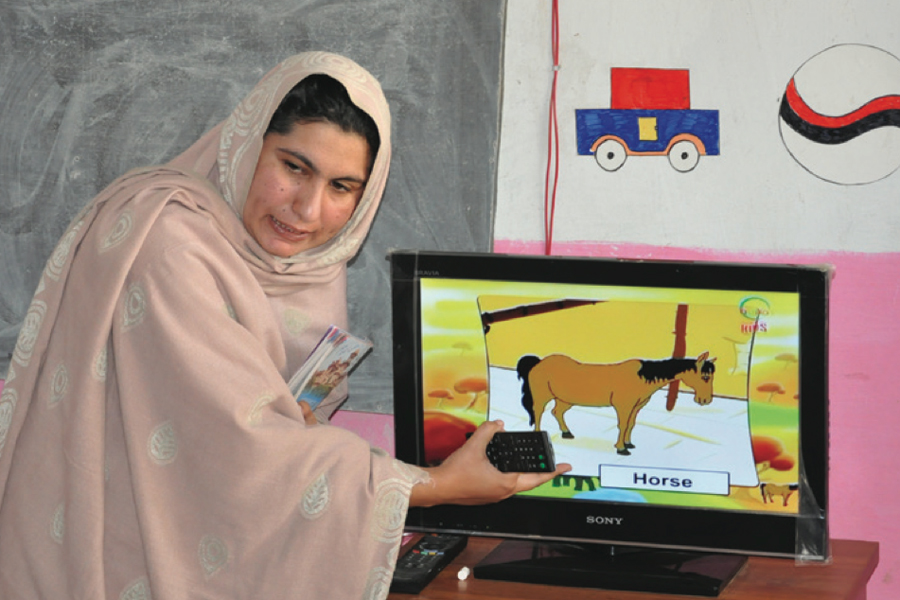DEVELOPMENTS
DFID Project Assists Local Groups in Sending Thousands of Pakistani Boys and Girls to School
Sep 17, 2014
In Pakistan, the constitution makes education for all children age 5-16 compulsory and requires that the state provide that education for free. Yet more than 9 million Pakistani boys and girls do not go to school. Even though this crisis feeds unemployment, poverty, and extremism, the Pakistani government is not giving it due attention.
Ilm Ideas, an education project funded by the U.K. Department for International Development (DFID) and managed by DAI, is taking an unorthodox approach to address this challenge by simply leveraging the ingenuity and determination of ordinary Pakistanis. Driven almost entirely by a grassroots demand for education, the results so far have been impressive: across the country, thousands more Pakistani children are now in school, and education advocates are energized. Even local governments are offering support.

“I am really very excited about the journey [that] Ilm Ideas has taken to date and where it can potentially go,” said Asyia Kazmi, DFID Pakistan’s senior education advisor for education innovation and outreach.
Funding Difference-Makers
The program began by asking hundreds of Pakistanis what was keeping children from attending school or receiving quality education. Among their answers: distance from schools, security issues, unwilling parents, inactive school management, teacher absenteeism, and a lack of schools for girls.
Ilm Ideas—Ilm is Urdu for “knowledge”—began in February 2012 as a three-year grants program designed to drive change by tapping the entrepreneurial spirit of the Pakistani people and channeling their demand for education. Rather than fund direct interventions, Ilm Ideas supports local champions for education. Through September, our two funds—the Innovation Fund and Voice & Accountability Fund—have committed £3.4 million to a portfolio of 41 projects and grants that are piloting education solutions and sponsoring local research and advocacy.
In the process of soliciting and nurturing new ideas, the Ilm Ideas team has been heartened by the commitment of Pakistanis to take education advocacy into their own hands. This tremendous interest was immediately evident in our initial discussions with stakeholders and experts, in our online polling, and in our first national call for proposals. Hundreds of people and groups submitted their ideas, which we reviewed and shortlisted.
Our grantees have taken it from there: Children’s Global Network Pakistan, for example, is training 300 entrepreneurs to open education centers in Khyber Pakhtunkhwa; the Society for Advancement of Education, one of the first Pakistani nonprofits to focus on access to education, is using pocket-size projectors to play instructional videos from Khan Academy; and the Family Educational Services Foundation is undertaking the Pakistan Sign Language (PSL) Project, to name just a few of the initiatives we have funded.
Riffat, an English teacher at one of five Deaf Reach schools in Sindh, who is deaf herself and the mother of three deaf children, said the PSL dictionary has opened up a means for the teacher, her students, and even parents to discuss school subjects, develop sign vocabulary, and express themselves.
“The PSL video is a very useful tool in the kindergarten classes,” she said. “The signs that students learn from the video are the ones that they use most often to communicate.”
Crucially, three projects funded by Ilm Ideas are being supported by the governments of the provinces in which they are operating:
- “Interactive radio instruction” by The Communicators alternative media organization will be scaled up to more than 1,500 classrooms across Islamabad.
- The Sindh government adopted the Active Classroom Initiative – Interactive Learning Content by Socio Engineering Consultants for implementation in local schools.
- AGHE’s “home-based schools” project in district Diamer has been adopted by the local administration of Gilgit Baltistan.
In addition, the Consumer Rights Commission of Pakistan’s Ilm Ideas-supported initiative, “Articulating Citizens’ Voice in the Education Sector,” has mobilized communities to establish and elect tehsil- (town) and district-level school councils, which are now discussing education budgets that were previously not subject to debate and public input.
While many cities in Pakistan have excellent education systems, Ilm Ideas is making progress in bringing education to hard-to-reach areas where children are less likely to be able to go to school. Currently, we are sponsoring local research and advocacy in 33 districts in Punjab, Gilgit Baltistan, and Sindh provinces, and piloting innovations in 40 districts across Azad Jammu and Kashmir, Balochistan, Khyber Pukhtunkhwa, Punjab, and Sindh.
Building In Sustainability
DFID is eager to see its grantees take their work forward as social enterprises after funding from Ilm Ideas has ceased. To this end, we are preparing them to sustain and succeed. In May, we launched a social enterprise incubator with invest2innovate, or i2i, an intermediary organization that supports early-stage enterprises and facilitates their access to capital. I2i will assist three of our grantees—the Pakistan Center for Philanthropy, The Communicators, and Socio Engineering Consultants—as the winners of an Ilm Ideas business plan competition.
Ilm Ideas also partnered with Developyst and the Pakistan Poverty Alleviation Fund to organize and launch the Education Innovation Alliance, a group of 24 leading thinkers and policy influencers from the education, government, microfinance, poverty alleviation, and technology arenas.
Ilm Ideas issued a special grant to SEBCON, a socioeconomic and business consultancy, to research the low-cost private school sector in Pakistan. Specifically, their work will determine what access-to-finance solutions are most relevant to the needs of these schools. By understanding the viability of this largely informal sector, donors and financial institutions can better weigh these schools as emerging business opportunities and mechanisms for delivering high-quality education. We will follow up on SEBCON’s findings with advocacy and awareness events with potential investors.
In August 2013, our Voice & Accountability Camp attracted 30 potential grantees who learned about accountability tools and processes and received orientation on the application requirements. With education specialists leading open sessions and smaller exchanges, our applicants drew up higher quality grant proposals.

Education in Pakistan is a paradox. Our country has some of the best universities and brightest professionals in the world, yet we have many communities and families utterly abandoned by or closed off from the education system. It does not have to be this way.
Not yet two years old, the Ilm Ideas project has facilitated numerous small, local victories. But it is demonstrating on a larger scale that people across this country, when given the opportunity, will join together and fight for their children’s access to an education and the benefits they will enjoy by going to school.